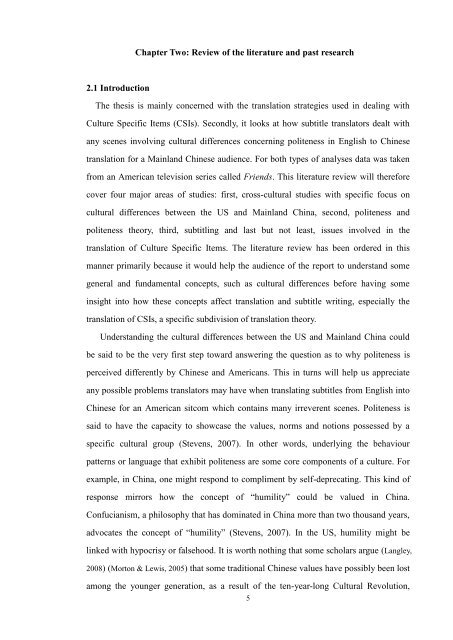View - Scholarly Commons Home
View - Scholarly Commons Home
View - Scholarly Commons Home
Create successful ePaper yourself
Turn your PDF publications into a flip-book with our unique Google optimized e-Paper software.
2.1 Introduction<br />
Chapter Two: Review of the literature and past research<br />
The thesis is mainly concerned with the translation strategies used in dealing with<br />
Culture Specific Items (CSIs). Secondly, it looks at how subtitle translators dealt with<br />
any scenes involving cultural differences concerning politeness in English to Chinese<br />
translation for a Mainland Chinese audience. For both types of analyses data was taken<br />
from an American television series called Friends. This literature review will therefore<br />
cover four major areas of studies: first, cross-cultural studies with specific focus on<br />
cultural differences between the US and Mainland China, second, politeness and<br />
politeness theory, third, subtitling and last but not least, issues involved in the<br />
translation of Culture Specific Items. The literature review has been ordered in this<br />
manner primarily because it would help the audience of the report to understand some<br />
general and fundamental concepts, such as cultural differences before having some<br />
insight into how these concepts affect translation and subtitle writing, especially the<br />
translation of CSIs, a specific subdivision of translation theory.<br />
Understanding the cultural differences between the US and Mainland China could<br />
be said to be the very first step toward answering the question as to why politeness is<br />
perceived differently by Chinese and Americans. This in turns will help us appreciate<br />
any possible problems translators may have when translating subtitles from English into<br />
Chinese for an American sitcom which contains many irreverent scenes. Politeness is<br />
said to have the capacity to showcase the values, norms and notions possessed by a<br />
specific cultural group (Stevens, 2007). In other words, underlying the behaviour<br />
patterns or language that exhibit politeness are some core components of a culture. For<br />
example, in China, one might respond to compliment by self-deprecating. This kind of<br />
response mirrors how the concept of “humility” could be valued in China.<br />
Confucianism, a philosophy that has dominated in China more than two thousand years,<br />
advocates the concept of “humility” (Stevens, 2007). In the US, humility might be<br />
linked with hypocrisy or falsehood. It is worth nothing that some scholars argue (Langley,<br />
2008) (Morton & Lewis, 2005) that some traditional Chinese values have possibly been lost<br />
among the younger generation, as a result of the ten-year-long Cultural Revolution,<br />
5

















